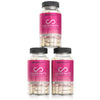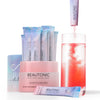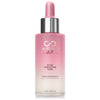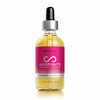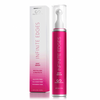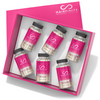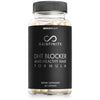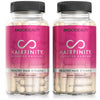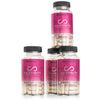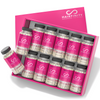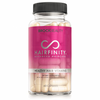
Targeted Hair Supplements: What Can They Do for You?
 When our hair needs extra oomph, we turn to outside help, from styling tips to bold new cuts. But what about help from the inside? That’s where targeted hair supplements can make a big difference.
When our hair needs extra oomph, we turn to outside help, from styling tips to bold new cuts. But what about help from the inside? That’s where targeted hair supplements can make a big difference.
Whether you’re experiencing thinning, lackluster growth, or just general “blah,” targeted hair supplements can give your tresses the fuel they need to bounce back.
Below, we’ve outlined the most common kinds of supplements for what ails you – and the natural ingredient that makes each supplement tick:
Great Growth
You’ve seen those extra hairs circling the drain, and you know the writing’s on the wall: your hair is thinning.
Before you freak out, it’s important to keep things in perspective, too: thinning hair is part of getting older.
“Half of women experience hair loss by the time they hit 50, according to the North American Hair Research Society,” reports Hallie Levine at Prevention.
But you don’t have to go it alone, says dermatologist Dr. Maryanne Senna.
“Find a dermatologist who, in their profile, specializes in hair loss,” suggests Senna at Refinery29.
As Senna indicates, you should always check with your doctor or dermatologist about hair loss and test for common causes of hormonal imbalance.
Everything from pregnancy to menopause to anxiety and thyroid conditions can throw your growth hormones out of whack – and cause major shedding.
In addition to following the advice of your doctor, taking targeted supplements for hair growth can help you address the problem, too.
According to Fitness, vitamins A and D can help you get back on track.
Vitamin D “helps control your body’s mineral balance, specifically zinc levels,” health writer Devora Neykova explains.
When your body’s zinc levels are on the fritz, “symptoms like a flaky scalp and thinning, lackluster hair may start to appear,” making Vitamin D an important nutrient to hunt down.
B-complex vitamins, including biotin, will also come to your rescue, says senior stylist Emily Heser.
“Vitamin B6 can be found in cruciferous veggies like kale, brussels sprouts, and broccoli, while vitamin B12 is found mostly in animal products like fish and dairy, as well as various cereals and nut milks,” Heser told Refinery29.
If you’re noticing a thinner ponytail, it might be time to pony up for the vitamins, so your hair can grow back stronger and healthier than ever.

Va-Va-Volume
Struggling to give your hair volume and lift?
“One of the most common causes of limp hair is applying conditioner too closely to the roots,” explains Anabel Kingsley, a hair and scalp expert, at Self.
“Coat only your mid-lengths and ends (where it’s needed most) to prevent the whole strand from feeling too weighed down,” she adds.
If your problem goes deeper and you have fine hair that stays limp no matter what you change in your styling routine, look for targeted supplements that offer amino acids.
“Forming the main bulk of each strand, amino acids (proteins) are the building blocks for hair growth,” Kingsley told Business Insider.
“However, as hair is non-essential tissue it will be the last to receive any you intake through your diet, and the first to suffer from a deficiency. Give your hair a nutritional boost with a supplement containing all essential amino acids.”
With a little bit of styling help – and the right nutrients – your hair should be good to go.
Shine, Shine, Shine
When hair is lackluster, it’s time to up your Omegas. Dullness in hair is often related directly to diet, says registered dietitian Wendy Bazilian, so make sure you’re getting your macronutrients.
“If you’re eating a highly processed diet, any nutrients you do get are shuttled to your body’s crucial operations, like your heart and other organs,” explains Bazilian at Prevention.
Take some time to reexamine your diet, and make sure you’re getting enough heart-healthy veggies, lean protein like fish, and healthy fats, like avocado or olive oil.
Above and beyond your day-to-day diet, taking a supplement containing Omega-6 and Omega-3s could help bring back the wattage to your hair, too.
Shine, baby, shine.

Damage Defense
Nothing’s worse than brushing your hair and hearing the telltale “snap, crackle, pop” of weak, damaged tresses.
Everything from excessive dryness to overstyling can cause hair to break under stress, says beauty editor Andrea Arterbery – but this is especially common for African-American women.
“Natural African-American hair is characterized by the bends of the fiber at every place that the hair curls,” Rolanda Johnson Wilkerson, a principal scientist for Pantene, told Arterbery at Cosmopolitan. “This is why African-American hair has a tendency to be drier and more fragile, exposing the hair to breakage.”
If you’re suffering from heat styling, chemical damage, or just plain dry hair, consider fortifying your locks with a collagen supplement.
Collagen helps build strong connective tissue in your joints and can even help reduce the appearance of wrinkles in skin.
While there’s still research being done about how collagen can help strengthen your hair, there are some studies that suggest these amino acids can help give your hair a boost.
Want more strategies for strengthening brittle hair? Check out this helpful resource from the editors of Prevention for more hair help.

Detox
Spend too much time at the colorist? Hit the pool every day this summer? Our everyday habits can wreak havoc on our hair – causing it to weaken over time, says trichologist David Kingsley.
“Women do so much to protect their skin on a daily basis but not enough to keep their hair healthy,” Kingsley told Health. “Too much styling and coloring can lead to loss of volume, breakage, dullness, and split ends.”
Breathe some life back into your hair with nutrients like Vitamin E and Zinc.
According to Fitness, Vitamin E helps promote circulation. “This means that it helps foster a healthy scalp, which lays the foundation for long, supple hair,” explains Neykova.
Zinc is another powerful hair aid, though it’s possible to use too much if you’re not careful, says nutritionist Gina Keatley.
“Zinc is important in many processes involving hair, skin, and nails but should only be used as a supplement if there is a need,” Keatley told Self. “Too much zinc can block the absorption of iron and copper, which are essential elements in hair.”
When you get just the right amount of these nutrients, your hair bounces back from damage with stronger follicles and happier, healthier growth.
Our genes and our habits dictate how our hair responds to everyday stressors like pollution and styling.
And while it may be tempting to blame bad luck or “bad hair days,” it’s important to understand that you have the power to change your hair from the outside in.
Eating a balanced, healthy diet is one of the best ways to combat lackluster growth or dullness, so make sure you’re getting hair-friendly nutrients – and consulting with a doctor – before making any drastic changes or adding supplements to your diet.





